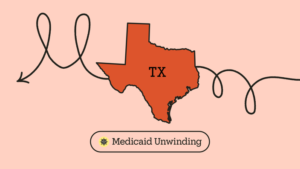This blog post was guest authored by Angela Ott, former Hogg Policy Fellow.
Background
In response to the COVID-19 pandemic in March 2020, the U.S. Department of Health and Human Services Secretary declared a Public Health Emergency (PHE). This allowed individuals, new moms, children, and families to receive continuous Medicaid and Children’s Health Insurance Program (CHIP) coverage without the need to renew their Medicaid coverage.
Prior to the PHE, eligibility documentation was required to be provided annually. The PHE from the COVID-19 pandemic extended coverage until March 31, 2023. Since then, each state has begun rechecking Medicaid eligibility for those who have been continuously enrolled under the PHE, a process referred to as unwinding.
Before the PHE termination, the Texas Health and Human Services Commission (HHSC) testified that they would struggle to process the immense workload of the impending Medicaid and CHIP renewals as they dealt with high vacancies and high turnover rates for eligibility employees.
During the 88th regular session, the Texas Legislature allocated $31,098,585 in general revenue (GR) and $61,253,821 in federal funds in fiscal year (FY) 2024 and $6,794,845 in GR and $14,178,839 in federal funds in FY 2025 for temporary full-time equivalent employees (FTEs) to support the anticipated increased workload for the unwinding of continuous Medicaid coverage. The positions are intended to be phased out by June 30, 2024. Despite this additional funding, the unwinding process is a massive undertaking for Texas, as HHSC must complete this process for more than 5.9 million Texans by May 2024.
Due to numerous factors, the majority of Texans losing Medicaid coverage during the unwinding process are losing coverage due to procedural denials, rather than the recommended ex parte processing. Ex parte refers to a process in which publicly available data, such as state wage databases or information from Supplemental Nutrition Assistance Program (SNAP) documents, are used to determine someone’s eligibility status for Medicaid. As of October 2023, 73 percent of Texas Medicaid denials were due to procedural reasons, such as failing to return the completed paperwork on time or not receiving the paperwork at all due to address changes. The remaining 27 percent were denied because they were determined ineligible due to Medicaid eligibility criteria.
However, HHSC has stated that the process of Medicaid redetermination does not apply to individuals who remain eligible for Supplemental Security Income (SSI), as individuals eligible for SSI are automatically eligible for Medicaid. Prior to the PHE, Texans who lost SSI coverage were automatically denied Medicaid. Following the unwinding process, HHSC sent renewal paperwork to individuals who lost SSI coverage during the PHE.
The Medicaid Unwinding and Mental Health & Substance Use
Because Medicaid is the largest payer of mental health and substance use care in the nation, Texans with mental health or substance use conditions who may lose coverage during this unwinding, whether erroneously or correctly, will lose out on life-saving care. Further, many people losing coverage have reported being unaware about the unwinding process or its impact on their insurance coverage. Medicaid enrollees have the highest occurrence of moderate to severe mental illness and substance use in comparison to individuals with private insurance, so this loss of care is particularly impactful.
Historically, many people with mental health conditions have had lower rates of health insurance coverage and reported significant barriers to care. Individuals with mental health or substance use issues often do not receive any care, and many more report an inability to follow up with care due to cost, regardless of insurance status. This care gap widens when considering individuals with moderate to severe mental health concerns.
Further, symptoms of mental health concerns and deaths due to substance overdose have steadily increased in the three years since the COVID-19 pandemic’s onset. In response to this increasing trend, many states, including Texas, expanded access to behavioral telehealth for Medicaid enrollees. Since then, behavioral telehealth remains one of the most highly utilized Medicaid services in the country. Considering these statistics, the Medicaid unwinding and the resulting loss of coverage for thousands of Texans may have a strong impact on mental health care access.
Due to the complicated nature of the unwinding process, many Texans with a serious mental illness (SMI) may find themselves unaware of coverage interruption or be confused about the steps needed to keep their insurance coverage. The Hogg Foundation provided funds to Prosumers International. to assist in educating peers and people with mental health conditions in every Texas county about the Medicaid unwinding process through educational materials.
Policy Recommendations
Medicaid unwinding is occurring in every state in the nation, and many people will lose coverage during this process. While we cannot address all the lost coverage due to ineligibility, our recommendations for improving this process for everyone involved include:
- Pausing Medicaid unwinding procedural denials in order to allow agency staff to catch up on backlog and redetermine erroneous denials;
- Providing resources to HHSC to allow for the majority of renewals to be done ex parte, and
- Ensuring that Texans with SMI are included in unwinding cohorts with special considerations.
Other information and policy recommendations can be found in this letter to the HHSC signed on to by the Hogg Foundation in August.
Related content:
-
A Vision for the Future: Policy Priorities, 2023-2024
- World Mental Health Day

